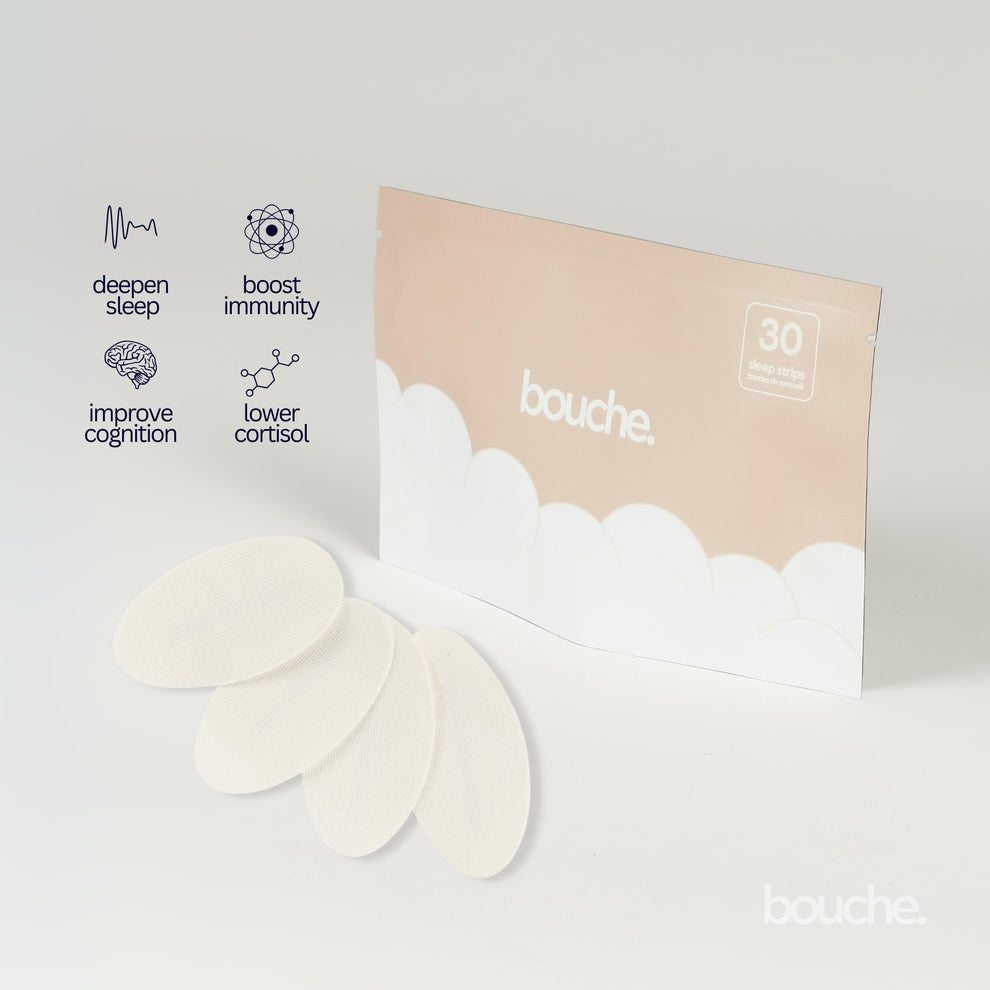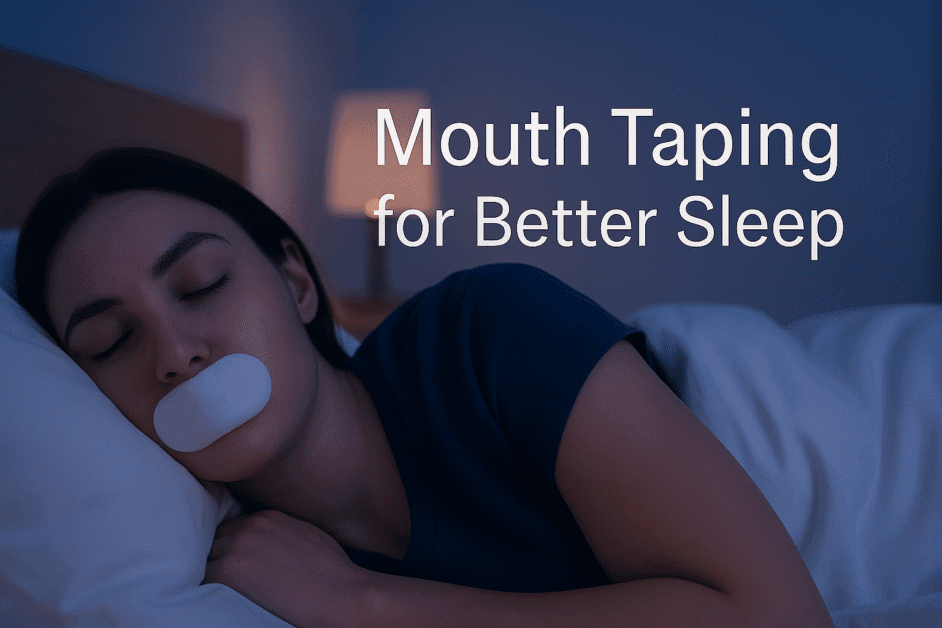Overview
Mouth taping is a sleep aid that involves placing breathable adhesive tape over your lips to encourage nasal breathing and reduce snoring. It’s growing in popularity due to potential benefits like better sleep, reduced dry mouth, and improved breathing. In this guide, we explain how mouth tape works, review safety tips and side effects.
What Is Mouth Taping?
Mouth taping involves placing a piece of skin-safe, medical-grade tape over your lips while you sleep to encourage nasal breathing and reduce mouth breathing. Bouche Mouth Tape is specially crafted to be the best mouth tape for sleeping, offering gentle adhesion and breathability for effective, comfortable use.

Benefits of Nasal Breathing During Sleep
Promoting nasal breathing at night is a main goal of mouth tape for sleeping. Some proposed benefits include:
- Improved oxygen uptake and blood pressure regulation
- Filtering and humidifying air, protecting airways from irritants
- Lower risk of dry mouth and bad breath
- Reduced snoring, supporting better sleep quality
- Possibly reducing oral health concerns, such as cavities and gum disease.
Bouche Mouth Tape is designed specifically to facilitate uninterrupted nasal breathing, supporting these potential benefits.
Is Mouth Taping Safe?
Many people ask, “Is mouth taping safe?” For healthy adults with clear nasal passages, mouth tape for sleeping can be safe if you choose the right tape and follow proper steps. However, it carries risks if you have:
- Nasal congestion, blockage, or chronic allergies
- Sleep apnea (especially moderate or severe)
- Heart or lung conditions
Potential risks include breathing difficulty, skin irritation, anxiety, and sleep disruption. Always consult a healthcare provider before starting, especially if you snore, have sleep disorders, or any underlying health issues.
Bouche Mouth Tape uses hypoallergenic, medical-grade adhesive to reduce the risk of skin reactions, making it a best mouth tape option for safety and comfort.
Mouth Tape for Snoring: Does It Work?
If you’re searching for “mouth tape for snoring,” evidence is limited but promising for select cases. Small studies show that using mouth tape may help reduce snoring and apnea episodes in people with mild, positional sleep apnea—particularly those who can breathe comfortably through their nose. However, for moderate or severe cases, or if you cannot breathe through your nose, mouth taping is not recommended and may be unsafe.
How to Tape Your Mouth Safely
If you’re considering mouth tape for sleeping, follow these steps to maximize safety:
- Consult a doctor first to rule out nasal blocks, allergies, or sleep apnea.
- Choose the best mouth tape: Use only hypoallergenic, medical-grade options like Bouche Mouth Tape—never household or duct tape.
- Test during the day: Wear the tape briefly while awake to ensure you can tolerate nasal-only breathing.
- Prep your lips: Clean and moisturize to reduce irritation.
- Apply gently: Place the tape horizontally or in an “X” pattern over closed lips—don’t overstretch. Follow Bouche’s package instructions for best results.
- Monitor tolerance: Remove the tape if you experience discomfort, anxiety, or trouble breathing.
- Take off slowly: To avoid skin irritation, gently peel away, especially if you have facial hair.
Mouth Tape Side Effects
While many tolerate mouth tape for sleeping, reported side effects include:
- Skin irritation or redness
- Allergic reaction to adhesives
- Anxiety or discomfort with restricted breathing
- Sleep disruption
- Difficulty breathing (particularly if nasal passages are blocked)
Choosing a high-quality, dedicated product like Bouche Mouth Tape helps reduce side effects due to its gentle, breathable materials.
Alternatives to Mouth Taping
If mouth taping isn’t suitable for you or you have concerns about “is mouth taping safe,” try these alternatives:
- Side sleeping to reduce snoring
- Nasal strips or internal dilators for airflow
- Allergy or congestion treatments
- Oral appliances or CPAP for diagnosed sleep apnea
- Improved oral hygiene for dry mouth and bad breath12
Try Bouche Mouth Tape for a safe, comfortable solution to encourage nasal breathing and potentially reduce snoring. Its medical-grade and skin-friendly design makes it the best mouth tape for sleeping, whether you’re a beginner or experienced user. Always prioritize safety, consult your doctor, and follow best practices for optimal results.
FAQs About Mouth Taping
A: No. Avoid if you have nasal congestion, allergies, sleep apnea, or chronic respiratory conditions.
A: Better filtration and humidification of air, improved oxygen efficiency, reduced snoring, better oral and gum health, and fewer dry mouth issues.
A: For some with mild snoring or mild, positional sleep apnea who can breathe easily through the nose, it may help. Large-scale studies are lacking.
A: Use hypoallergenic, medical-grade tape (never standard adhesives), test it while awake, and consult your doctor beforehand.
A: Bouche Mouth Tape, designed specifically for overnight use, is hypoallergenic, gentle, and breathable for maximum safety and comfort.
Ref:



